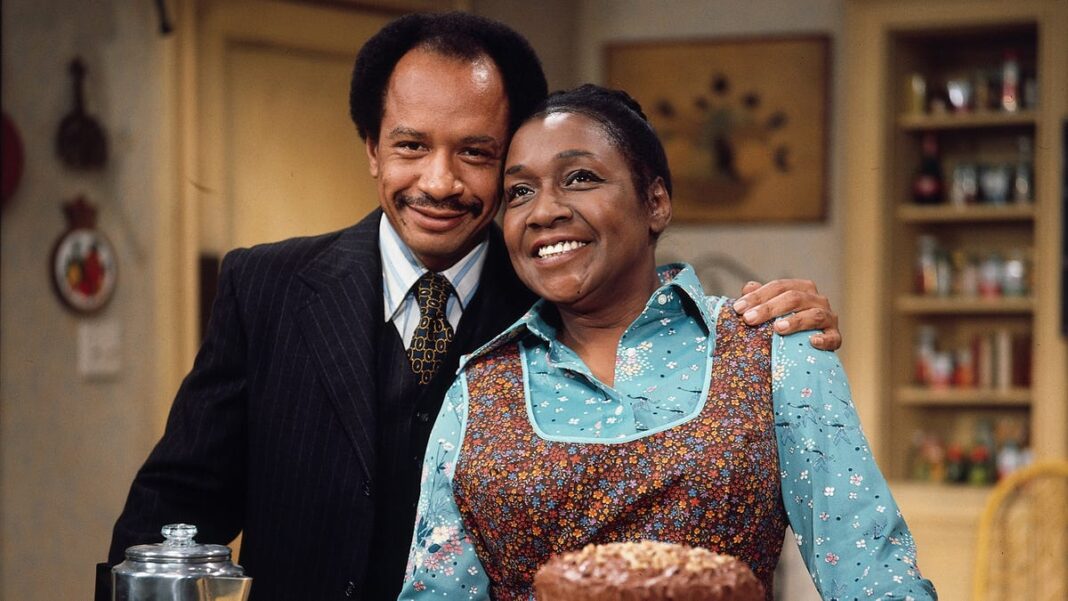Celebrating 50 Years of ‘The Jeffersons’: How Norman Lear Redefined Black Representation on Television
Lasting for 11 seasons, “The Jeffersons” outperformed any of producer Norman Lear’s iconic comedies from the 1970s, even its predecessor, “All in the Family.” However, its groundbreaking legacy began with its debut episode, which aired 50 years ago this week: CBS’ “The Jeffersons” was the first comedy focused on a Black family that did not depict them as struggling financially.
The characters George and Louise Jefferson, portrayed by Sherman Hemsley and Isabel Sanford, were simply affluent. This change in portrayal can be partly attributed to the influence of the Black Panthers.
As racial divides began to diminish and representation in media expanded during the early 1970s, the most significant strides were made in sitcoms. Several shows featuring Black characters, such as a version of Neil Simon’s “Barefoot in the Park,” the military comedy “Roll Out” from the creators of “M*A*S*H,” and the barbershop sitcom “That’s My Mama,” had fleeting successes. However, two shows gained massive popularity: NBC’s “Sanford and Son” and CBS’ “Good Times.” While these shows depicted challenging lives in predominantly Black neighborhoods—the Sanfords were junk dealers in the impoverished Watts area of Los Angeles, and “Good Times” was based in a Chicago housing project—they reinforced certain stereotypes, taking one step forward, but also one step back.
‘The Jeffersons’ Ascend the Ranks
“The Jeffersons” brought a new perspective to primetime television. It depicted George and Louise as they celebrated their dry cleaning business success by moving from a modest rowhouse in Queens to an upscale apartment on Manhattan’s Upper East Side. Their challenges were more about adjusting to a new cultural environment rather than financial hardship, as they navigated their new lives among the affluent.
The spin-off became a certainty after Hemsley appeared in “All in the Family” during Season 4. Sanford had been portraying Louise Jefferson since 1971, along with Mike Evans as their son Lionel, but it wasn’t until 1973 that Lear secured Hemsley for the role of the family head.
In his 2014 memoir, “Even This I Get To Experience,” Lear detailed how a surprising encounter outside of show business helped expedite the show’s launch.
Black Panthers Inspire a Shift in Comedy
“One day, three members of the Black Panthers stormed into my office at CBS saying they’d come to see the garbage man – me,” Lear recounted. “They told me ‘Good Times’ was garbage, saying it was just a white man’s interpretation of a Black family… Every time a Black man appears on television, he’s portrayed as being dirt poor.’”
Lear created “The Jeffersons” in response to this critique. Following a farewell to “Family,” which acted as an unofficial pilot, “The Jeffersons” premiered on Jan. 18, 1975. Aiming for a prime Saturday night slot, the show quickly gained a strong viewership, wrapping up its first season as the fourth most-watched program.
“The Jeffersons” also featured a larger ensemble cast than Lear’s previous shows, allowing for diverse storylines. Alongside Hemsley and Sanford, the show included Marla Gibbs as their housekeeper, Zara Cully as George’s mother, Paul Benedict as their British neighbor, and Berlinda Tolbert as Lionel’s girlfriend (and later wife). Notably, their parents, played by Roxie Roker and Franklin Cover, made history as the first interracial couple regularly featured on primetime television.
Politics Took a Backseat in ‘The Jeffersons’
While initial episodes touched on the social issues surrounding their move to Manhattan—addressing matters of identity and using terms like Uncle Tom and passing—the show did not attract headlines in the same way “All in the Family” or Lear’s more controversial series “Maude” did. Over time, race became a less central theme, and the series leaned toward a more traditional sitcom format. George Jefferson’s earlier abrasive prejudices were less pronounced; his character became more humorous than confrontational, serving as a lighthearted foil within his family dynamics.
Even so-called “special episodes”—like Louise recounting her more modest upbringing, Lionel dealing with a drinking problem, or George reconnecting with a long-lost Navy buddy who is now a woman—centered on universal themes rather than solely racial experiences.
A notable installment was “The First Store” (1980), a flashback episode that depicted the opening of Jefferson Cleaners coinciding with Martin Luther King Jr.’s assassination. Following Lear’s passing in 2023, The Hollywood Reporter cited this episode among “Six Norman Lear TV Episodes That Changed the World.”
Despite not receiving Emmy nominations for writing or directing, it won two awards, one for videotape editing and another for Sanford, who was recognized as the first Black woman to win Best Comedy Actress. The show faced criticism from some in the Black community for perceived stereotypes and for portraying George as a clownish figure, with critiques like Gregory Kane from The Baltimore Sun labeling it “demeaning to Black people” in a 1999 essay about race and TV. Nevertheless, “The Jeffersons” played a pivotal role in bridging the gap from “Black shows” to series featuring Black casts, paving the way for NBC’s “The Cosby Show” in 1984.
“Its characters opened doors for future Black actors,” wrote Danielle Cadet for The Huffington Post after Hemsley’s death in 2012, emphasizing its impact in proving that African American sitcoms were capable of resonating with broader audiences.
The lasting influence of “The Jeffersons,” which concluded in 1985 after 253 episodes and numerous timeslot adjustments, is notable: it was the first Black sitcom since “Sanford and Son” (1972-77) to be listed among the top five television shows, the first to be the top comedy for a season (1981-82), and remains CBS’s third-longest-running sitcom of its time, as well as the enduring record-holder for the longest-running Black comedy in network television history. Lear reimagined one episode in a live 2019 special for ABC, starring Jamie Foxx and Wanda Sykes as lead characters.
Achieving success required significant effort, but “The Jeffersons” ultimately climbed that hill.

